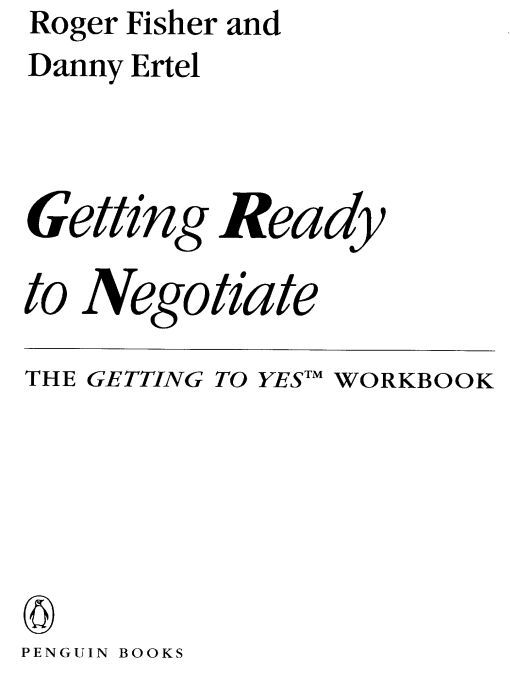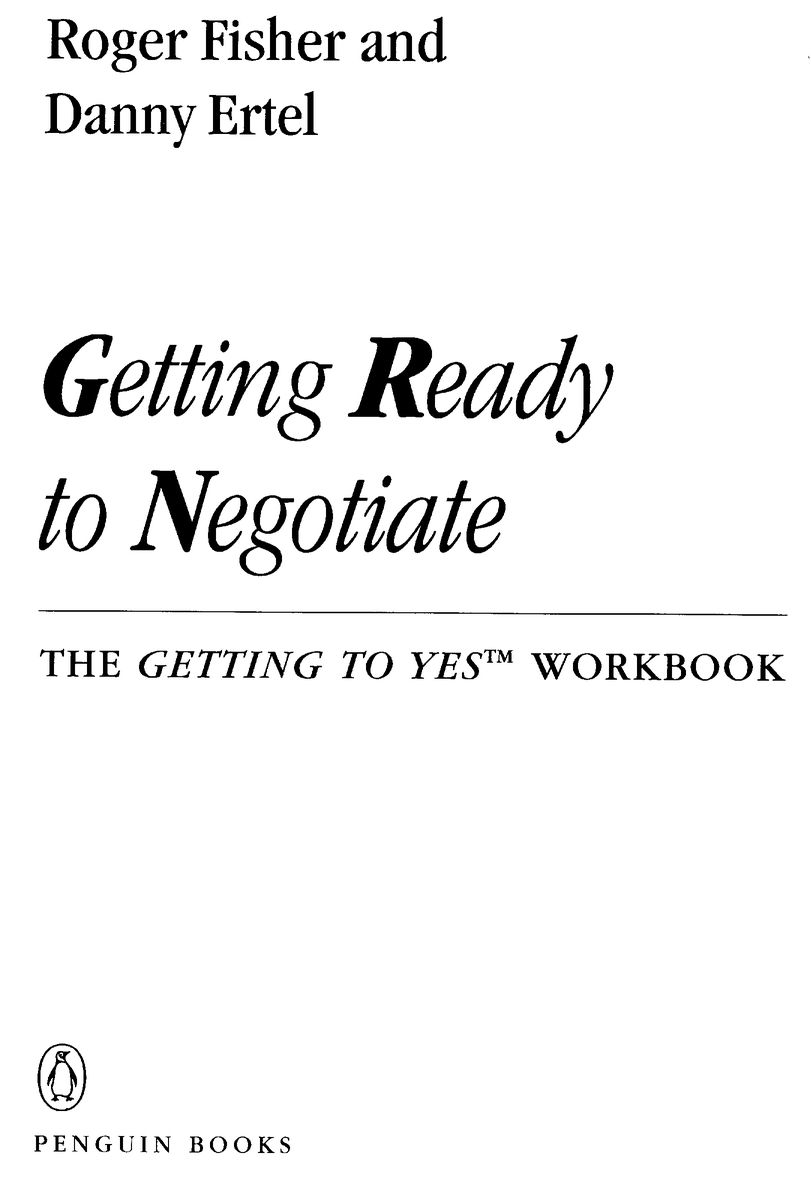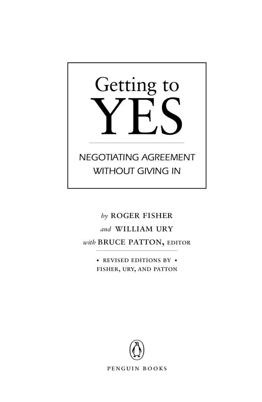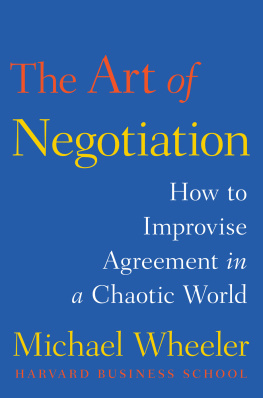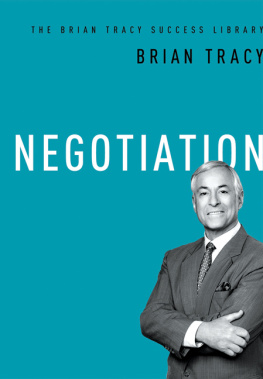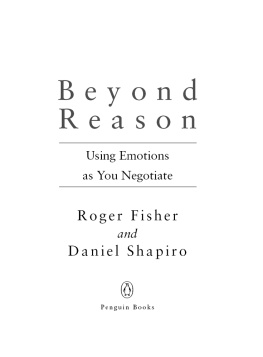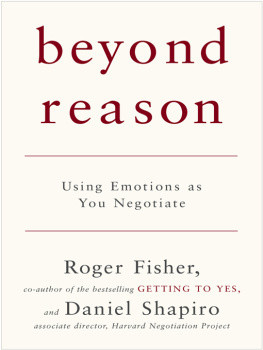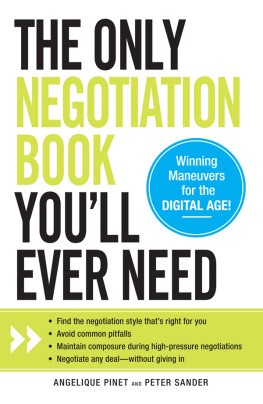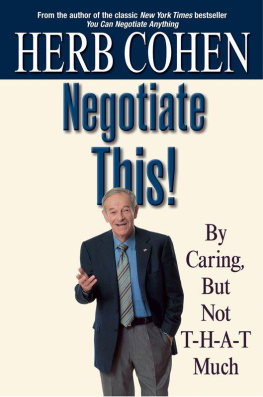Table of Contents
PENGUIN BOOKS GETTING READY TO NEGOTIATE
Roger Fisher is director of the Harvard Negotiation Project, Samuel Williston Professor of Law, Emeritus, Harvard Law School, and coauthor of the international bestseller Getting to Yes: Negotiating Agreement Without Giving In. He is also a founder and active member of Conflict Management, Inc., and the nonprofit Conflict Management Group, two consulting organizations devoted to strategic advice and negotiation training.
Danny Ertel is a founding partner of Vantage Partners, LLC. Prior to founding Vantage, Mr. Ertel headed up the Latin American Practice at Conflict Management, Inc., was a Senior Researcher at the Harvard Negotiation Project, taught negotiation at the University of Toronto Law Faculty, practiced law with Debevoise & Plimpton, and served as a law clerk to the Hon. Justice Harry A. Blackmun on the U.S. Supreme Court. Mr. Ertels first book, Beyond Arbitration (1991) (with Ferrara) was selected by the CPR Legal program as the winner of its 1992 Book Award. He is also the co-author, with Roger Fisher, of Getting Ready to Negotiate (1995), and editor of Negociacin 2000 (1996). A leading authority on negotiation, relationship management, and conflict management, Mr. Ertel has written for, or been quoted in the Harvard Business Revew, the Sloan Management Review, the Economist, Purchasing Today, and Financial Executive, among others. Mr. Ertel is a graduate of Harvard College and Harvard Law School, where he was Managing Editor of the Harvard Law Review. Mr. Ertel is also CEO and Chairman of Vantage Technologies, a company focused on creating enterprise software that leverages the consulting tools and expertise of Vantage Partners.
Conflict Management, Inc. (CMI), acts as an advisor to and trainer for organizations and individuals on negotiation and on the process by which they manage critical external and internal relationships. CMI provides training, facilitation, mediation, and dispute resolution services to its clients throughout the world.
ACKNOWLEDGMENTS
No project like this is the work of just two people. We could never have created this workbook without the help, support, and encouragement first and foremost of our families, friends, and clients. Many people have read this manuscript, and many more have read Getting to Yes. From our conversations with people from all walks of life who took the time to share their thoughts with us on one manuscript or the other, we learned a lot about what was missing in those pages, and what would make this workbook a worthwhile addition to the tools that help busy people do good and do well. In particular, we want to thank all of you who served as guinea pigs with early versions of our various forms and examples. You know who you are, and in these pages you see the fruits of your efforts.
In addition, and just as important as the help we received from those who do not do this work for a living, is the assistance and advice we received from our friends and colleagues at the Harvard Negotiation Project, CMI, and CMG. The help we received from each and every one of our colleagues was selfless and invaluable. Every chapter we circulated for comments came back with thoughtful queries, useful ways to rethink or reframe an issue, and encouragement to continue. And, as in every situation, there were a few people who played relatively larger roles who we would like to specially thank. They are Scott Peppet and Drew Tulumello from Harvard, and Heather Meeker Green, Melannie Merkau, and Liliana Zindler from CMI. Without their willingness to help get things done under difficult conditions and during several late nights, we could have never completed this project.
Roger Fisher
Danny Ertel
Using This Workbook
CHAPTER 1
Introduction
Why a workbook to help people prepare for a negotiation? Getting to Yes was published more than a dozen years ago. It has sold millions of copies. Yet even its readers and fans tell us that they often feel uncomfortable and uncertain about how they negotiate; the process is sometimes stressful and the outcome worse. They know how a negotiation ought to go, but they can feel ripped off and pushed around, or they might agree to something that is worse than it should be, damaging relationships along the way. Perhaps they should have walked out and gone somewhere else, but they did not know when to leave or where to go. These are some of the symptoms that inspired us to write this book.
Diagnosis: unprepared
Whatever kind of negotiation we facefrom an internal office problem to an international sale, from seeking a raise to buying a business, from dealing with a union to dealing with the Russianslack of preparation is perhaps our most serious handicap. This is true whether the negotiation is ongoing or has not yet begun, and no matter how much experience we have. In fact, the more experienced we are, the greater the risk that we fall into an established preparation routine that takes little account of the particular people with whom we are dealing or the particular problem with which we are confronted.
At Conflict Management, Inc., and Conflict Management Group (two con-suiting firms formed to take the concepts and tools of the Harvard Negotiation Project out to the world of business and public policy) we have consistently found that one of the most powerful things we can do to help negotiators get good results is to help them prepare more effectively. We have found this to be true when working with people in businesses, governments, guerrilla groups, and labor unions.
Why are negotiators unprepared?
People assume just talking is low risk
Sometimes we may think that preparation is unimportant. Since we know that we cannot be forced into an agreement, we see little risk in saying, Lets hear what the other side has to say. If we like it, we can accept it. If we dont, we can walk away. Over the years, however, we have seen that the risks of being unprepared are high. How will we know whether we should agree unless we have some precedents or other benchmark for evaluating the agreement? How will we know whether to walk away unless we have some idea of how well we can expect to do elsewhere?
Perhaps more important, by being unprepared we surrender initiative to the other side. We lower the possibility that we can come up with some good ideas and arguments that will quickly solve the problem to our mutual satisfaction. We deprive both sides of our creativity.
Preparation takes too much time
Preparation does take timebut it probably saves more time than it takes. A well-prepared negotiator can narrow the issues for agreement, formulate elegant options, or evaluate tentative offers far more quickly and wisely than a negotiator who does not know the terrain. On average, we think that you should spend as much time preparing as you expect to spend in face-to-face negotiation. Certainly, some matters are trivial and neither deserve nor require much preparation. Others, however, involve high stakes, multiple issues, and perhaps several parties. In such cases extensive preparation is a good idea. Whatever the situation, spending time on preparation is likely to save time in the long run.

